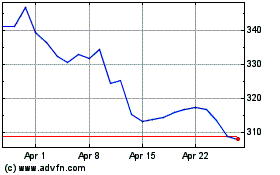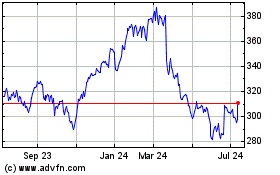Global investment triples to $12.2 billion in
2014
Bank’s organisational culture requires change
to work effectively with start-ups
Global investment in financial-technology (fintech) ventures
tripled from $4.05 billion in 2013 to $12.2 billion in 2014, with
Europe being the fastest growing region in the world, according to
a new report by Accenture (NYSE:ACN). Last year, fintech investment
increased at more than three times the rate of overall venture
capital investment.
While the United States still captures the lion’s share of
fintech investment, Europe experienced the highest growth rate,
with an increase of 215 percent to $1.48 billion in 2014. The
United Kingdom and Ireland (UKI) accounted for more than two-fifths
(42 percent) of the European total, as investment in the region
rose from $264 million in 2013 to $623 million in 2014.
In the rest of Europe, the regions that experienced the most
significant levels of investment in 2014 were the Nordic countries
($345 million), the Netherlands ($306 million) and Germany ($82
million).
“The massive investment in fintech shows that the digital
revolution is well advanced in financial services, and it is both a
threat and an opportunity for banks,” said Julian Skan, Accenture
managing director overseeing the FinTech Innovation Lab London.
“Fintech is empowering new competitors and start-ups to move into
parts of the banking business but, paradoxically, it is also
helping banks to create better, more convenient products and
services for their clients. It is also leading to increased
cooperation between traditional banks and innovative start-ups and
technology businesses in a way that can result in totally new
business models and revenue streams.”
The report, The Future of Fintech and Banking, released at the
third annual “Investor Day” of the FinTech Innovation Lab London,
suggests that many established banks are not well equipped to deal
with the digital revolution. According to a survey of 25 senior
banking executives involved in technology innovation, 72 percent of
the respondents feel their banks have a fragmented or opportunistic
approach to dealing with digital innovation, and 40 percent think
the time it takes their organisation to deploy new technology is
too slow, either negatively impacting their ability to realise
value or providing no net benefit at all.
The vast majority also believe that they lack the skills and
culture needed to succeed in the digital age. Among respondents,
four out of five say that when it comes to skills and culture,
their banks are only “somewhat” or “minimally” equipped for the
digital age. In addition, although 80 percent see working with
start-ups as a valuable way to bring new ideas to their business,
56 percent claim that their organisational cultures need to change
in order to work effectively with start-ups.
Forty-four percent of the executives surveyed claim that their
banks do not invest enough in innovative technologies, and while
all of the respondents believe that legacy technology presents an
issue to their organisations, only half say their bank has a
strategic approach to replacing its old technology.
Despite these challenges, the report also suggests that many
banks feel confident about the future. Three-fifths of survey
respondents believe that banks and new competitors will coexist by
providing differentiated offerings, or the established banks will
acquire the new players.
A majority of respondents (72 percent) expect their banks to
increase investment in technology innovation over the next two
years. Fifty-six percent say their banks will explore open
innovation, such as opening up their intellectual property, assets
and expertise to outside innovators to help generate new ideas and
discover new areas for growth. Thirty-two percent say their banks
will create a corporate venture arm within the next two years.
The report shows that banks are also open to collaboration with
their peers and with organisations outside of their industry, to
more effectively adopt innovative technologies, with all survey
respondents saying they are willing to do so. Furthermore, 60
percent of respondents say they are open to sacrificing current
revenue in order to move to new business models.
“Banks are starting to realise the full potential of digital
technologies and their potential to disrupt and transform the
banking industry,” said Richard Lumb, group chief executive,
Financial Services, Accenture. “The leaders recognise that digital
goes far beyond channel and process innovation - it dissolves
industry boundaries and provides opportunities for new business
models and competitors, and banks have no choice other than to
innovate to remain relevant to their customers. It is encouraging
that many are receptive to the idea of open innovation,
collaboration and fintech investment and also are prepared to
sacrifice current revenue in order to move to new business models.
But banks need to innovate faster, become more nimble and develop a
more entrepreneurial culture if they are going to compete
effectively and meet customers' needs.”
The FinTech Innovation Lab London, launched by Accenture in
2012, is a collaboration between Accenture and leading financial
institutions, and is supported by the Mayor of London, the City of
London Corporation and Innovate UK. It is designed to nurture
early-stage companies from the UK, Europe and elsewhere that are
developing new technologies for the financial services sector.
Since the launch of the FinTech Innovation Lab London, the 14
companies that have passed through the program have raised more
than $35 million in new investment, signed nearly 50 contracts to
do business with banks and increased revenues by 170 percent. The
2015 Lab participants are: Atsora, Cytora, Duco, Pontus Networks,
Ripjar, Torusware, and xWare42. Their innovations include a
web-based programme for real time geopolitical risk assessment,
solutions that help small business owners manage their finances,
and faster data exchange and reconciliation technologies.
The FinTech Innovation Lab London is modelled on a similar
program that was co-founded by Accenture and the Partnership Fund
for New York City in 2010. The Partnership Fund for New York City
is the $110 million investment arm of the Partnership for New York
City (www.pfnyc.org). In 2014, Accenture also launched the FinTech
Innovation Lab Asia-Pacific in Hong Kong and the FinTech Innovation
Lab Dublin in Ireland.
Methodology
The study is based on Accenture’s analysis of fintech
investment-data from CB Insights, a global venture-finance data and
analytics firm. The analysis included global financing activity
from venture capital and private equity firms, corporations and
corporate venture-capital divisions, hedge funds, accelerators, and
government-backed funds. Fintech companies are defined as those
that offer technologies for banking and corporate finance, capital
markets, financial data analytics, payments and personal financial
management. The list of deals included are dynamic and constantly
changing, as new companies are added to the database; all publicly
known fund raises for a company, which can include earlier rounds,
are back filled into the database. In addition to the fintech
investment-data, Accenture conducted a survey of 25
innovation-focused senior banking executives from across the banks
that participate in the FinTech Innovation Lab London and Dublin.
The banks involved represent 40% of the top 10 global banks by
market capitalisation including two of the world’s top five banks;
however, these survey responses do not represent a statistically
significant sample size, and should be used only as an indicative
guide.
About Accenture
Accenture is a global management consulting, technology services
and outsourcing company, with approximately 319,000 people serving
clients in more than 120 countries. Combining unparalleled
experience, comprehensive capabilities across all industries and
business functions, and extensive research on the world’s most
successful companies, Accenture collaborates with clients to help
them become high-performance businesses and governments. The
company generated net revenues of US$30.0 billion for the fiscal
year ended Aug. 31, 2014. Its home page is www.accenture.com.
AccentureMelodie Laroche-Gray, + 44 207 844
8513melodie.laroche-gray@accenture.comorFrançois Luu, + 33 6 60 53
84 28francois.luu@accenture.com
Accenture (NYSE:ACN)
Historical Stock Chart
From Mar 2024 to Apr 2024

Accenture (NYSE:ACN)
Historical Stock Chart
From Apr 2023 to Apr 2024
